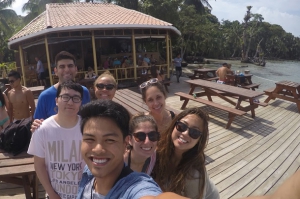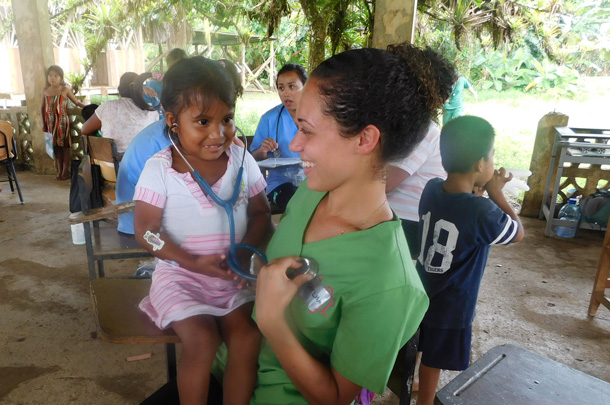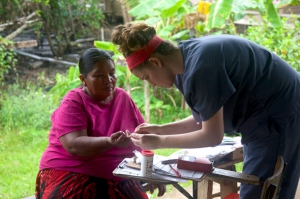It was March 2015, and about a dozen students enrolled in USC’s global medicine program were gathering some typical spring break memories — drenching thunderstorms, rickety boats, flesh-biting flies, relentless mosquitos and long treks through knee-deep mud.
The USC students welcomed these challenges while furthering their educations in partnership with the Floating Doctors program, gaining firsthand clinical experiences in the rural northern islands of Panama.

Matthew Rafiei, Daniel Doo, Olivia McReynolds, Justin Finuliar, Melanie De Shadarevian, Kaylha Munn and Sarah Figueroa gather outside Bibi’s oceanside restaurant in Panama. Finuliar said it was the group’s go-to place for food after clinic duties, including “delicious octopus dishes and pineapple ceviche.”
Justin Finuliar, who is pursuing a master’s degree in the global medicine program, was among that spring break group, and he found the experience enlightening.
“It was an eye-opener to see in today’s modern age, in such a picturesque landscape filled with such grateful people, the lack of resources available to them,” Finuliar said. “The locals have to deal with these hardships every day. It was truly a humbling experience.”
Finuliar and several classmates shared the insights they gained during immersive study programs in Panama, as well as in Denmark, Italy, Taiwan, Mongolia, India and Israel, with more than 150 other students, faculty and family members during a daylong Global Citizenship Roundtable held Aug. 28 in Aresty Auditorium on the Health Sciences Campus. Presentations highlighted the unique cultural, social and economic conditions in each country and the impact on the health of populations. Attendees had an opportunity to contrast the high degree of need among villagers in remote Panama, for example, with the highly integrated social welfare model of health care in Denmark.
Participation in the roundtable is a requirement for global medicine students who travel abroad as part of their studies, including recipients of funding assistance from the Dhablania and Kim Family Global Medicine Fellowship.
Dilara Onur, who recently earned her degree in USC’s Master of Science in Global Medicine program, traveled to both Taiwan and Panama as part of her USC academic program. She received a Dhablania and Kim Family fellowship for her Panama trip thanks to a proposal to study the prevalence and cultural influences of iron deficiency anemia (through hemoglobin finger prick tests) in women and children of the indigenous communities in Bocas del Toro, Panama.
“Because there is very limited data in this region, my fellowship was to establish a baseline, if you will, so that Floating Doctors and future USC global medicine groups could continue the project,” Onur said. “After I left, the hemoglobin levels were added to the patient charts to ensure that the test would be a standard part of patient intake.”
Other DK fellows traveled to India, where one investigated village-based sanitation solutions and another examined education and knowledge levels concerning effective treatment for diarrhea in infants. Another fellow studied breast cancer in Israel, while another performed work to support ongoing research to identify and address post-partum depression in women in Mongolia, with an ultimate goal of influencing government health policy there.
For the first time, the Global Citizenship Roundtable also included students visiting USC from another country. Ten participants in an exchange course with Denmark joined the roundtable
“The Global Citizenship Roundtable is always even more meaningful and informative than we anticipate, more so this year with our guests from Denmark here to be a part of our dialogue,” said Elahe Nezami, PhD, director of the global medicine program. “The students emphasize the importance of gaining firsthand experiences abroad with such enthusiasm that it is impossible not to see ourselves as part of a larger global citizenry.”
The USC Master of Science in Global Medicine seeks to answer the urgent worldwide need for professional training in concepts of international medicine. Students in this program gain the strong medical science foundation needed to analyze, understand and solve worldwide health issues. The opportunity to study outside the United States is a key component.
The Dhablania and Kim Family Global Medicine Fellowship helps selected students by providing funding for research and study relating to global medical need. In 2015, the inaugural year of this award, $75,000 in total funding was made available, with individual awards of as much as $5,000.
“Receiving the DK Fellowship marks a huge milestone in my academic career,” Onur said. “It was such an exponential learning experience, where I felt that I learned so much in such a short amount of time. I grew not only as an aspiring physician but also as a young adult seeking to make a positive impact on the local and global communities around me.”
This type of personal growth is typical for student participants, Nezami noted. “This is one of the aims of our program, and we are so glad that the Keck School continues to embrace our place as a leader in global education.”
The application process for the 2016 awards will begin Oct. 1. The fellowships are open to Keck School graduate, professional and medical students, as well as medical residents in the Keck School of Medicine. For more information, go to http://keckmed.usc.edu/msgm/Global-Medicine-Fellowship.html or contact Nezami directly at nezami@usc.edu.
The USC medical students who participated in the recent roundtable expressed no regrets about devoting their supposed break from the classroom during the holidays, in the spring or during the summer to academic travel.
Onur’s memories from her studies abroad involve making connections with community members in places she was visiting.
She comforted a young girl in a dentist’s chair in Quebrada Sal, Panama.
She taught a member of a convalescent home in Bocas del Toro how to use her camera.
And she did her best to converse — while “failing miserably” — with an elderly woman on a bus in Taipei.
“These were all small but special moments in which I was able to make a true connection with someone whom I never would have had the opportunity to do so otherwise,” Onur recalled. “Despite the language and other cultural barriers, one person can have a special connection with another. Those are the times that I will never forget.”
— Les Dunseith



